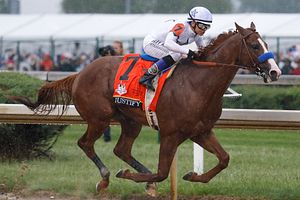Justify won the day at the Kentucky Derby on Saturday. So did China.
In an unlikely achievement for a club founded only five years ago, the partners of China Horse Club find themselves winners of the Kentucky Derby, with a horse they jointly own with WinStar Farm and others.
Unusual for winner’s circle celebrations, however, was a conspicuous absence on the dais of any of the Chinese owners of China Horse Club. Photos of the rain-soaked event show a full complement of representatives from WinStar Farm and other owners, but only Teo Ah Khing, the Malaysian founder of China Horse Club, is seen reveling with them.
Where were the Chinese owners of China Horse Club? Could they not get visas? There are over 200 of them, reports say. The United States and China may have their problems, but for such an innocuous yet wonderful achievement as owning the winning horse in the Kentucky Derby, congratulations are due all around. There’s just one problem. We can’t celebrate with the Chinese owners, because we don’t know who they are.
A read through China Horse Club’s Website offers few clues. Biographical background information for Teo Ah Khing and several advisory council members are listed; only one is Chinese. The Shanghai address for China Horse Club, a block away from the John Portman-designed Shanghai Centre, is listed with a phone number, but readers are told to contact the Singaporean number of Eden Harrington to discuss membership. Photos show lots of horses, foreign faces, and racing staffs, but no group portraits of proud Chinese owners.
According to a New York Times article that came out on May 4, just before the Run for the Roses in Louisville last week, the vice president of China Horse Club, Eden Harrington, declined to disclose identities of the club’s members. Harrington is quoted by the Times as justifying the opaque ownership of the club, in order to “shield” members from inquiring eyes during the ongoing crackdown on corruption, suggesting that the spending of large sums “may be seen as excessive” in such a climate. The argument flies in the face of reality in China today, where conspicuous consumption is alive and well. It begs the question, if the money is all squeaky clean, why is any member worried about being caught up in a corruption investigation?
Harrington is also quoted as saying that the club vets members in order to ensure that no money used to join the club was obtained illegally. Experienced practitioners of due diligence on persons and companies in China know how difficult that is, and the lengthy degree to which time, money, and relationships must be leveraged to perform the process reliably.
By all appearances, however, China Horse Club is dripping in international legitimacy. John Warren is listed on the China Horse Club’s “International Advisory Council” website page as the club’s bloodstock advisor. Warren holds the same position for no less than Queen Elizabeth II. With that on the CV, it becomes almost a footnote to note that Prince Harry joined Teo Ah Khing at a groundbreaking ceremony for a development project on St. Lucia in 2016.
China Horse Club is now the newest successful manifestation of the perfectly understandable Chinese yearning for recognition and status, and is yet, at the same time, a perfect example of one of the most defining political and cultural characteristics holding China back from world-class greatness: a systemic and insidious lack of transparency.
Remaining behind a screen may seem like a strategy to appear mysterious and unattainable, but the reason for obsessive personal and organizational privacy in China is more basic than that. Transparency, in a country where institutions are weak and political figures are strong, is dangerous. What you don’t know about me, you can’t report me for.
Indeed, a fundamental function of China’s one-party state is to prevent transparency. As its own watchdog, the Chinese Communist Party (CCP) cannot cede power to other groups in society to criticize or change its behavior. Government operations which the Party controls must therefore, by definition, remain murky. A press mostly in lockstep with the government varnishes the results.
Trusted world organizations doubt the data that comes out of China. Foreign banks fight for reliable information from Chinese partners. Foreign companies in Chinese joint ventures often live in a state of perpetual confrontation with their Chinese partners over access to information within the company.
Chinese students, children of Communist Party leaders and a newly minted Chinese business class, are known to commonly use aliases while studying in the United States, the United Kingdom, and elsewhere, in order to protect their identities and those of their families. Universities aid in the behavior. The same practice takes place among well-placed Chinese hired by foreign firms.
We don’t know who the China Horse Club members are. We don’t know how they made their money. Perhaps it’s all perfectly above-board. If so, it’s a pity they are so secretive — the owners cannot openly share their joy and delight in having a played a hand in winning an iconic, world-class, sporting event.
On the other hand, if some owners of China Horse Club have come by their reported $1 million-plus membership fees in ways that would not withstand a closer look, one could ask if their win on Saturday will have been worth it. With success, comes scrutiny.
Wherever one looks in China, a lack of transparency hides the view. The China Horse Club is a now a prominent symbol of a pervasive problem. But the racing industry, steeped in tradition wherever it exists, values its prestige in equal measure with its horses’ bloodlines. And the Chinese government is underpinning its legitimacy by waging a war on corruption. One can wonder which will be first past the post in taking a closer look at the newest winners at Churchill Downs.

































